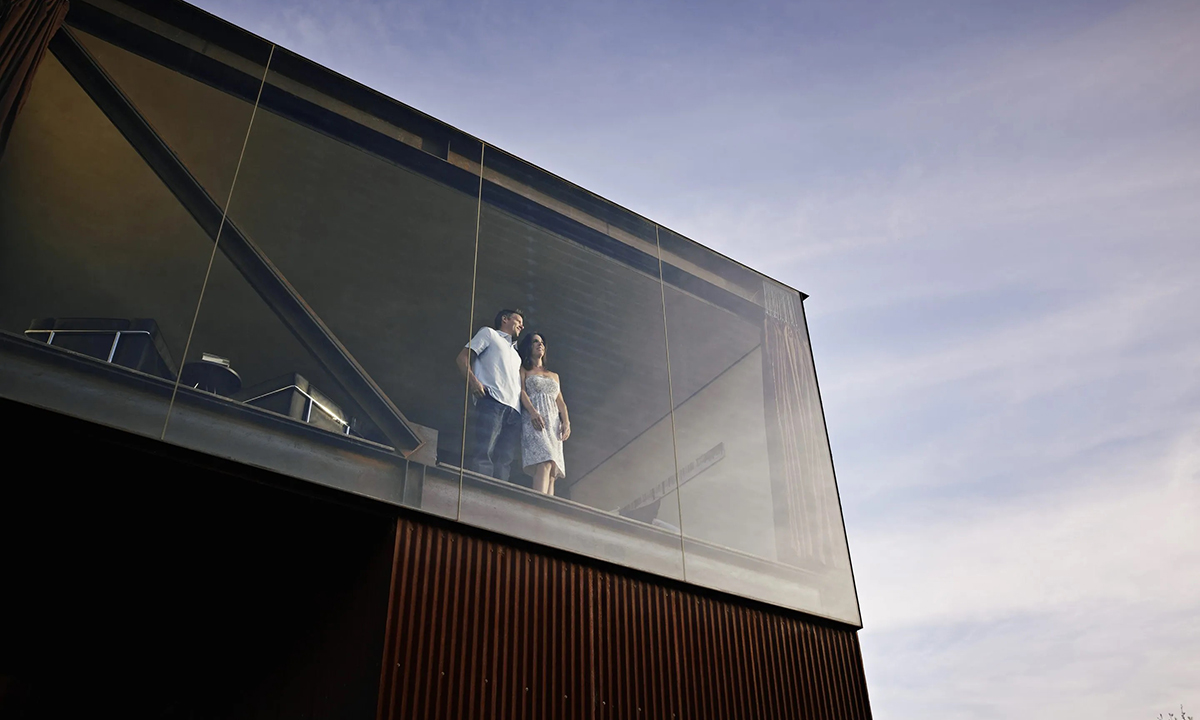
去年12月,,《財富》雜志曾經在一篇文章中寫道,,我們正處于“美國房地產市場貧富分化的新時代”,。時至今日,這句話放到一個單獨的語境下似乎依舊成立,。今年第二季度,,豪宅價格創(chuàng)歷史新高,但購買者依舊大有人在,。
據Redfin統(tǒng)計,,普通豪宅達到1,180,000美元的歷史高價,同比增長約9%,。這是近兩年來的最大漲幅,,而且增長速度是普通非豪宅房價增速的兩倍以上。后者僅上漲了不到4%(但普通非豪宅的中位數房價依舊上漲至342,500美元,,Redfin表示這是創(chuàng)紀錄的高價),。
分析師稱,,第二季度,豪宅銷量依舊有小幅上漲,,但普通住宅銷量下滑超過3%,,成為“十年來銷量最低的第二季度”。根據全美房地產經紀人協(xié)會(National Association of Realtors)的數據,,今年6月份,,百萬美元以上豪宅的銷量實際上同比有所上漲,但其他所有價位的住宅銷量都出現了下滑,。當然,,整個房地產市場都已經不像疫情之前那么火爆,但豪宅市場的增長速度更快,。
沃斯堡的一位Redfin房地產中介在分析報告中表示:“價格合理的高端住宅依舊有強勁的需求,,特別是那些外觀精美和可以拎包入住的房產。我們有一位客戶最近掛牌出售一套240萬美元的房產,,最終售價為260萬美元,。如果一套住宅定價合理,外觀吸引人,,并且不需要任何裝修,,這種情況下我們依舊會收到多個出價?!?/p>
雖然每個人都能感受到高房價的影響,,但快速上漲的抵押貸款利率對富人來說卻不是障礙,因為他們全款買房,。Redfin指出,,在第二季度的大部分時間,抵押貸款利率高于7%,,但對于全款買房的購房人來說,,這毫無影響。今年春天,,在截至5月的三個月,,約44%的已售出豪宅均被全款買下(這個比例與去年基本相當)。此外,,根據全美房地產經紀人協(xié)會的數據,,6月全款購房的比例占總成交量的28%(與去年和上個月相比均沒有太大變化)。
在城市層面,,豪宅中位數售價漲幅最大的是普羅維登斯,,其次是圣何塞和紐約州拿騷縣。此外,,豪宅銷量增長幅度最大的是納什維爾,、坦帕和西雅圖,。但第二季度成交價最高的兩套豪宅,位于科羅拉多州的度假城市格倫伍德斯普林斯,,其中一套豪宅的成交價為7,700萬美元,。洛杉磯的一套豪宅成交價約6,300萬美元,排在第三位,。
Redfin高級經濟學家謝哈里亞爾·博卡里表示:“豪宅市場經受住了今年高抵押貸款利率的影響,,這得益于有大量購房人全款購房。隨著銷量趨于穩(wěn)定和更多住宅掛牌待售,,豪宅房價不太可能繼續(xù)維持高速上漲,。”不止豪宅,,所有房產的庫存都在增長,,而且住宅在市場上的待售時間更長。一位來自奧蘭多的Redfin中介表示:“海外現金買家依舊交易活躍,,但我們看到本地買家的交易活動有所放緩,。”
因此情況似乎正在發(fā)生變化,。上周四發(fā)布的另外一份Redfin分析報告顯示,,普通住宅月供降至四個月來的最低點,而且如果隨著通脹降溫,,抵押貸款利率繼續(xù)下降,,月供也將隨之減少。平均30年期固定抵押貸款的周利率為6.78%(日利率略高),。
但人們依舊很難買得起一套普通住宅,。根據Zillow的數據,今年6月,,普通抵押貸款還款額比疫情之前增長了超過112%,。在疫情引發(fā)的房地產市場繁榮期間,房價大幅上漲,,而隨著美聯儲為抑制通脹進行加息,,抵押貸款利率也隨之上漲。入門級住宅即將絕跡,,而購買一套入門級住宅需要的工資水平,自疫情以來已經增長了近一倍,。因此,,盡管目前抵押貸款利率下降,房價上漲放緩,,美國的房地產市場遠遠沒有恢復到疫情之前的水平,。
本月早些時候,,奧巴馬時期的美國住房與城市發(fā)展部部長、房地產非營利組織企業(yè)社區(qū)合作伙伴(Enterprise Community Partners)的首席執(zhí)行官肖恩·多諾萬在接受CNBC采訪時表示:“我們剛剛度過了美國史上最嚴重的房屋可負擔性危機,?!痹诖酥埃琑edfin的高級經濟學家趙晨(音譯)表示:“買不起房是目前美國房地產市場的真實寫照,?!?/p>
上周的數據顯示,6月現房銷量環(huán)比和同比均有所下降,;部分原因是抵押貸款利率鎖定效應,,潛在賣房人因為目前已經不存在的低抵押貸款利率而放棄賣房。另外一部分原因則是需求下降,,而且我們看到由于需求下降,,6月新房銷量降至七個月最低。并非人們不需要房子,;人們確實需要,,但購房成本讓他們望而卻步,有些人甚至選擇了毀約,。只是對于富人而言,,這些都不成問題。(財富中文網)
譯者:劉進龍
審校:汪皓
去年12月,,《財富》雜志曾經在一篇文章中寫道,,我們正處于“美國房地產市場貧富分化的新時代”。時至今日,,這句話放到一個單獨的語境下似乎依舊成立,。今年第二季度,豪宅價格創(chuàng)歷史新高,,但購買者依舊大有人在,。
據Redfin統(tǒng)計,普通豪宅達到1,180,000美元的歷史高價,,同比增長約9%,。這是近兩年來的最大漲幅,而且增長速度是普通非豪宅房價增速的兩倍以上,。后者僅上漲了不到4%(但普通非豪宅的中位數房價依舊上漲至342,500美元,,Redfin表示這是創(chuàng)紀錄的高價)。
分析師稱,,第二季度,,豪宅銷量依舊有小幅上漲,但普通住宅銷量下滑超過3%,,成為“十年來銷量最低的第二季度”,。根據全美房地產經紀人協(xié)會(National Association of Realtors)的數據,,今年6月份,百萬美元以上豪宅的銷量實際上同比有所上漲,,但其他所有價位的住宅銷量都出現了下滑,。當然,整個房地產市場都已經不像疫情之前那么火爆,,但豪宅市場的增長速度更快,。
沃斯堡的一位Redfin房地產中介在分析報告中表示:“價格合理的高端住宅依舊有強勁的需求,特別是那些外觀精美和可以拎包入住的房產,。我們有一位客戶最近掛牌出售一套240萬美元的房產,,最終售價為260萬美元。如果一套住宅定價合理,,外觀吸引人,,并且不需要任何裝修,這種情況下我們依舊會收到多個出價,?!?/p>
雖然每個人都能感受到高房價的影響,但快速上漲的抵押貸款利率對富人來說卻不是障礙,,因為他們全款買房,。Redfin指出,在第二季度的大部分時間,,抵押貸款利率高于7%,,但對于全款買房的購房人來說,這毫無影響,。今年春天,,在截至5月的三個月,約44%的已售出豪宅均被全款買下(這個比例與去年基本相當),。此外,,根據全美房地產經紀人協(xié)會的數據,6月全款購房的比例占總成交量的28%(與去年和上個月相比均沒有太大變化),。
在城市層面,,豪宅中位數售價漲幅最大的是普羅維登斯,其次是圣何塞和紐約州拿騷縣,。此外,,豪宅銷量增長幅度最大的是納什維爾、坦帕和西雅圖,。但第二季度成交價最高的兩套豪宅,,位于科羅拉多州的度假城市格倫伍德斯普林斯,其中一套豪宅的成交價為7,700萬美元,。洛杉磯的一套豪宅成交價約6,300萬美元,,排在第三位。
Redfin高級經濟學家謝哈里亞爾·博卡里表示:“豪宅市場經受住了今年高抵押貸款利率的影響,,這得益于有大量購房人全款購房,。隨著銷量趨于穩(wěn)定和更多住宅掛牌待售,豪宅房價不太可能繼續(xù)維持高速上漲,?!辈恢购勒蟹慨a的庫存都在增長,,而且住宅在市場上的待售時間更長,。一位來自奧蘭多的Redfin中介表示:“海外現金買家依舊交易活躍,但我們看到本地買家的交易活動有所放緩,?!?/p>
因此情況似乎正在發(fā)生變化。上周四發(fā)布的另外一份Redfin分析報告顯示,,普通住宅月供降至四個月來的最低點,,而且如果隨著通脹降溫,抵押貸款利率繼續(xù)下降,,月供也將隨之減少,。平均30年期固定抵押貸款的周利率為6.78%(日利率略高)。
但人們依舊很難買得起一套普通住宅,。根據Zillow的數據,,今年6月,普通抵押貸款還款額比疫情之前增長了超過112%,。在疫情引發(fā)的房地產市場繁榮期間,,房價大幅上漲,而隨著美聯儲為抑制通脹進行加息,,抵押貸款利率也隨之上漲,。入門級住宅即將絕跡,而購買一套入門級住宅需要的工資水平,,自疫情以來已經增長了近一倍,。因此,盡管目前抵押貸款利率下降,,房價上漲放緩,,美國的房地產市場遠遠沒有恢復到疫情之前的水平。
本月早些時候,,奧巴馬時期的美國住房與城市發(fā)展部部長,、房地產非營利組織企業(yè)社區(qū)合作伙伴(Enterprise Community Partners)的首席執(zhí)行官肖恩·多諾萬在接受CNBC采訪時表示:“我們剛剛度過了美國史上最嚴重的房屋可負擔性危機。”在此之前,,Redfin的高級經濟學家趙晨(音譯)表示:“買不起房是目前美國房地產市場的真實寫照,。”
上周的數據顯示,,6月現房銷量環(huán)比和同比均有所下降,;部分原因是抵押貸款利率鎖定效應,潛在賣房人因為目前已經不存在的低抵押貸款利率而放棄賣房,。另外一部分原因則是需求下降,,而且我們看到由于需求下降,6月新房銷量降至七個月最低,。并非人們不需要房子,;人們確實需要,但購房成本讓他們望而卻步,,有些人甚至選擇了毀約,。只是對于富人而言,這些都不成問題,。(財富中文網)
譯者:劉進龍
審校:汪皓
In December last year, Fortune wrote we were in the midst of “a new American era of housing haves and have-nots.” It still seems to hold true today, maybe in a separate context. Luxury-home prices hit an all-time high in the second quarter of the year, and yet people are still buying them.
The typical luxury home sold for a record $1,180,000, an increase of almost 9% from a year earlier, according to Redfin. It was the greatest leap in close to two years, and happens to be more than twice as fast as non-luxury, typical home prices, which only rose under 4% (although still to what Redfin called a record-high median of $342,500).
And still, luxury-home sales rose in the second quarter, albeit slightly, while normal-home sales fell more than 3% to the “l(fā)owest second-quarter number in a decade,” the analysis read. In June, according to the National Association of Realtors, sales for million-dollar-plus homes actually rose from a year ago, whereas all other price categories saw their sales decline. Of course, the entire housing world is seeing less bustle than before the pandemic, but the luxury corner looks to be moving faster.
“There is still strong demand for well-priced, high-end properties, especially those which are presented beautifully and [are] move-in ready,” a Redfin agent in Fort Worth said in the analysis. “We had a client recently list a property for $2.4 million that we ended up selling for $2.6 million. We are still seeing multiple offers in situations where a property is priced accurately, [is] visually appealing, and doesn’t need any work.”
And while everyone feels the effects of sky-high home prices, soaring mortgage rates are no obstacle for the wealthy, for a particular reason: all-cash. For most of the second quarter, as Redfin points out, mortgage rates were higher than 7%, but it didn’t matter if you paid in cash. This spring, in the three months ended in May, almost 44% of luxury homes sold were purchased with all cash (not much of a difference from last year, by the way). Separately, according to the National Association of Realtors, all-cash sales accounted for 28% of transactions in June (also not much of change from last year or the prior month).
On a metro level, the median sale price of luxury homes rose most in Providence, followed by San Jose, and Nassau County, N.Y. Meanwhile, luxury-home sales increased the most in Nashville, Tampa, and Seattle. But the two most expensive homes sold in the second quarter were in Glenwood Springs, a resort city in Colorado; one cost as high as $77 million. Los Angeles had the third-most costly sale, at about $63 million.
“The luxury market has withstood the havoc wreaked by high mortgage rates this year, thanks to an abundance of all-cash buyers,” noted Redfin senior economist, Sheharyar Bokhari. “Now that sales are stabilizing and more homes are being listed for sale, it’s unlikely that luxury prices will continue to grow at quite as high a rate.” All inventory is increasing, luxury or not, and homes are staying on the market longer. An Orlando-based Redfin agent said, “international cash buyers are still driving activity, but we have seen a slowdown in local buyers.”
So things are changing, it seems. Another Redfin analysis out Thursday showed typical monthly housing payments fell to their lowest point in four months, and if mortgage rates continue to decline as they have on the back of cooler inflation, payments will, too. The weekly average 30-year fixed mortgage rate came in at 6.78% (daily rates are a bit higher).
Still, it isn’t easy to afford an ordinary home. In June, according to Zillow, the typical mortgage payment increased by more than 112% since before the pandemic. Home prices went up substantially during the pandemic-fueled housing boom and mortgage rates followed, once the Federal Reserve raised interest rates to tame inflation. Starter homes are going extinct, and the salary needed to buy one has almost doubled since the pandemic. So even now that mortgage rates are falling and home prices are rising at a slower pace, we’re nowhere near our pre-pandemic housing market.
Earlier this month, Shaun Donovan, former U.S. Secretary of Housing and Urban Development in the Obama era and chief executive of housing nonprofit Enterprise Community Partners, said in an interview with CNBC: “We’re just coming through the worst housing affordability crisis we’ve ever seen in this country.” Before that, Redfin senior economist, Chen Zhao, said: “Unaffordability is really the story in the housing market right now.”
Just this week, data showed existing-home sales fell on a monthly and annual basis in June; part of that is still the lock-in effect in play, as would-be sellers cling to their homes for their low, or nonexistent, mortgage rates. The other part is that demand is off, and we saw exactly that with new-home sales, as well, which declined to a seven-month low in June. It isn’t that people don’t need homes; they clearly do, but that cost is deterring them from buying, to the extent that some are even backing out of deals. Only that doesn’t seem to be the case for the wealthy.






